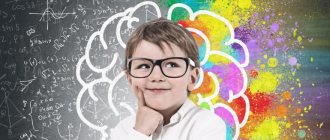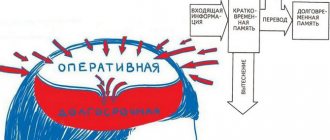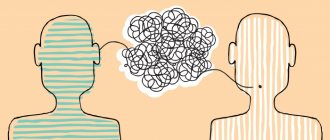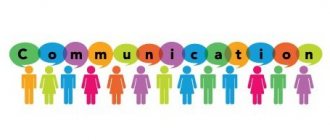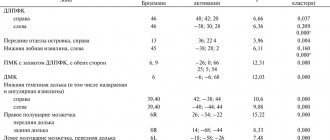Thinking and speech are what distinguishes a person from an animal. Verbal and logical thinking is inherent only to man; it is formed in the process of his development and maturation.
Thinking is the highest level of cognition, the process of recreating the reality around us. Thinking is often identified with the mind. This is not entirely true.
If the mind is the ability to think and find solutions to various problems, then thinking is a prerequisite of the mind , a tool of a thinking person, working with meanings.
Thinking, speech and logic
Human thinking is verbal, it is formed in the process of communication and its formation is possible only through the joint activity of people. All people are different, some people find it easier to think if they see or imagine objects - this is visual thinking. Others operate with abstract structures (words) - this is what distinguishes verbal logical thinking.
Speech is a form of communication between people using language constructs created according to historically established rules, the highest mental function of a person. Speech formulates thoughts using words and presupposes their understanding and perception by another person.
Logic literally means reasoning, speech, thought. Logic is a science that teaches us to draw conclusions indirectly, that is, not from sensory experience, but from previously acquired knowledge.
How to promote formation?
There are several methods for forming and studying thinking, and each of them must be approached with the utmost seriousness, patiently practicing over a long period:
- Let's take the book. It is desirable that this be a work with a well-known plot. And we begin to read his text from end to beginning (in reverse order), trying not to lose the essence and sequence of events.
- We choose one of our friends and begin to imagine in vivid colors how he would react to a certain event. We play out a variety of scenarios in our heads: negative, joyful, neutral. You can remember the people with whom you had to communicate during the day and once again “scroll” the conversation with each of them in your head, without missing a single detail (looks, facial expressions, gestures, intonations, movements, etc.).
- We come up with as many contradictions as possible (dry water, sweet salt, etc.).
- We select any object and begin to name its functions. (A chair is needed to sit, to get an object from the height of a cabinet, etc.). You can also come up with several functions that are not inherent to this item, but be sure to visualize them.
- We come up with abbreviations for phrases (abbreviations). Very different, and the more, the better.
- We divide the sheet into two parts: on one we write nouns, on the other we write adjectives. Then we select a pair for each that suits the meaning.
- We choose any letter and write on paper the maximum number of words that begin with it.
- We remember some important event in life. We restore in memory emotions, vivid details, unusual moments and highlight the most amazing plot from all this. We come up with an unusual name for it and visualize the picture in our mind.
- Let's draw. You can choose pencils, markers, paints, crayons - anything! The main thing is to depict an object or person on a sheet of paper or canvas so that its character is visible at first glance.
An interesting game for developing verbal thinking on video:
Exercises and games
Special exercises and games will help improve verbal and logical thinking . Also, such activities contribute to the development of imagination and intelligence. The main thing is to remember that to get results from any activity, a system is important.
This is why you need to do exercises regularly and efficiently.:
- Getting rid of monologues in our thoughts . Each person conducts an imaginary monologue throughout the day, which is based on various thoughts and reasoning. But in order to give the consciousness at least a little rest, it is very important to regulate the “flows” of monologues, especially if they are based on negative feelings and fears.
- Training your inner voice . To do this, you need to choose one phrase and say it to yourself throughout the day. Moreover, this must be done by changing the tempo, emotional coloring, volume, etc. You can also “pronounce” it as different people (acquaintances and strangers) would pronounce it. At the end of the exercise, you need to imagine the phrase in the form of three-dimensional letters that slowly float before your eyes to “examine” each of them.
- We read quickly . High reading speed allows you to cover a large amount of the page with your eyes, as your eyes “jump” from one phrase to another. This approach stimulates analytical processes. And therefore, it contributes to the development of thinking.
- We carry out cluster analysis . To do this, we identify one existing problem, write it down on a separate sheet of paper and circle it. Then we listen to our feelings and write down all the associations caused by this problem, and also circle each of them. After this, we connect the circles with arrows, thereby connecting our own thoughts into one whole.
- We are conducting an entertaining activity . Several people must participate (children can be invited). We take small pieces of paper or cardboard, write any words on them and mix them. Then we give each participant to draw one such card. Task: take turns reading a word and quickly come up with a sentence with it.
- We read tongue twisters . The participants of the game sit in a circle and take turns reading the word-plexes. Moreover, each new task should be even more confusing (difficult to pronounce) than the previous one.
- Let's play "dissent" . The activity perfectly develops abstract thinking and is especially popular with children. Its essence is to name things in an unusual way (carpet - bedding, chair - nurse, etc.). The basis is taken from the objects that are in the room.
- Let's play aliens . The essence of the game is to imagine that a person is communicating with an alien creature that has no idea about the life of earthlings. And the main task is to explain to him the most ordinary things, feelings and phenomena so that he understands what we are talking about.
Such techniques will be interesting and useful for both children and adults. But for classes to bring results, they should be carried out regularly and efficiently.
To diagnose (assess) the level of verbal-logical thinking, you can use the methods of O.A. Fedoseeva. “Generalization of Concepts”, K. Goldstein “Classification of Objects”.
Types of logical thinking
During the preschool period, all cognitive processes are formed , among which the most important place belongs to the development and formation of thought and speech.
- Visually effective things are formed in early childhood, from about one and a half years old. The child's first generalizations are associated with the same actions performed with similar objects. Suppose a child sees a bottle of milk - now he will be fed. In adult life, it is used, for example, in experiments whose results cannot be predicted in advance.
- Visual imagery usually manifests itself most clearly in children 4-6 years old. It operates with images and involves visualizing the situation. Most often, direct contact with the object is not required, but it is necessary to clearly imagine it. If you ask a child what a dog is, he will point to a picture or a puppy sitting next to him, rather than listing the number of paws and ears of the animal. Adults use it to describe concepts that they cannot see - the structure of a molecule, the earth's core.
- Verbal logical usually begins to develop in older preschool and primary school age, continuing to form and develop throughout life. This is the ability to think through reasoning, carried out using language and logical operations with concepts, the latest stage in the evolution of thinking.
An example is the coin example . If it is visually effective, a person will see a fallen coin and realize that he can take it in his hand or put it in his mouth, since it will fit there. If it is visually figurative, he will throw it up and see what comes up, heads or tails. With the verbal-logical one, he will begin to argue about whether it can hang in the air or stand on its edge, and if not, then why.
Symptoms
A person with dysarthria speaks incomprehensibly, unclearly, and has what is called “porridge in his mouth.”
This happens due to the poor relationship (innervation) of the muscles of the vocal folds, respiratory muscles, tongue, soft palate, lips - everything without which speech reproduction is impossible. Articulatory motor skills can be different, and this is due to the condition of the muscles:
- their muscle spasm is accompanied by tension in the muscles of the tongue, neck and lips. The latter are tightly compressed, which limits the pronunciation of sounds;
- with hypotension (low tone), the mouth remains half-open, since the lips are not closed, saliva flows from it. The tongue, without moving, is at the bottom of the mouth. Paresis (relaxation) of the soft palate leads to speech “in the nose”;
- Dystonia increases muscle tone when trying to speak.
Sound pronunciation depends on the degree of dysarthria. Thus, erased is characterized by weak distortions and some blurriness, and 2 and 3 – speech is slurred, very slow, unemotional, sounds in which are missed or incorrectly pronounced. Total paralysis of the muscles involved in speech is the most severe degree, the 4th, in which it is generally impossible to say anything.
Sounds with dysarthria are difficult to articulate, this applies to both consonants and vowels. Whistling and hissing sounds are pronounced between the teeth or sideways, hard sounds are softened, ringing sounds are muffled.
Speech breathing is impaired in various types of pathology - it is rapid and even intermittent, shortened during exhalation. The voice is weak, fading, dull, nasalized. Speech is monotonous, there is no modulation.
Verbal logical thinking
Thanks to verbal thinking, we operate with such concepts as honor, conscience, love, value. After all, we cannot visualize them - these are verbal constructions , perhaps everyone puts their own meaning into them.
As a result of verbal logical thinking, a person can operate with the most abstract concepts without completely breaking away from sensory experience. With its help, we look for and find patterns, generalize previously gained experience - both sensory and visual.
Verbal logical thinking does not descend upon us overnight; it is gradually formed throughout life, in the process of learning and gaining personal experience. Some people master it to a greater extent than others; we call them talents or geniuses, while others master it less.
Causes
The prerequisites for such a speech disorder usually arise during the development of the fetus, during the birth process and the first years of the baby’s life (65-85%). In this way, it is similar to cerebral palsy, and also accompanies it, and the more severe the motor disorders with such a serious pathology, the more pronounced the dysarthria.
Perinatal reasons:
- severe toxicosis in the expectant mother;
- Rhesus conflict;
- the presence of a chronic disease in a woman in labor;
- fetal hypoxia;
- intrauterine asphyxia;
- difficult childbirth;
- prematurity;
- kernicterus in a newborn.
Other factors:
- intoxication of the body;
- hydrocephalus;
- encephalitis and meningitis;
- traumatic brain injury;
- purulent otitis.
In adults, dysarthria can occur as a result of head trauma, stroke, neurosurgery, or due to a brain tumor.
This pathology, in addition to cerebral palsy, can occur in those suffering from Parkinson’s disease, mental retardation, multiple sclerosis, myasthenia gravis, neurosyphilis, etc.
Operations of verbal logical thinking
In the learning process, we operate with certain concepts .
- Analysis is a transition from the general to the specific, the division of an object into components, the differentiation of various properties, elements, and connections in it.
- Synthesis is a transition from the particular to the general. Combining the constituent parts into a single whole.
- Comparison is a comparison of phenomena and objects, isolating their differences and similarities with each other.
- Generalization is the unification of phenomena and objects according to significant characteristics, one or more.
- Classification – grouping according to characteristics. In contrast to generalization, which is based on significant features, classification recognizes desirable but unimportant features as a basis, for example, drink preference.
Mastering new things
Identify a new skill for yourself - something you don’t know how to do yet. For example, master speed reading or an unfamiliar language. Describe what resources you will need to develop it, with what frequency and under what conditions will you do this, according to what plan? In the case of speed reading, for example, courses and simulators of the same name from Vikium will be of great help. After going through them, you will be able to “devour” books, deeply understanding their content (this can be done even in a store, without leaving the rack!), prepare training and work presentations, reports, reports more quickly and productively, and also free up a huge amount of time for myself.
Have you written everything down? Now let's start implementing it!
The importance of developing verbal logical thinking in children
It is necessary to develop verbal logical thinking in preschoolers because children will soon begin studying. From the first days they will study subjects based on logic , and unprepared children will have a very difficult time.
Undeveloped verbal logical thinking interferes with the assimilation of knowledge, leads to the inability to express one’s thoughts, and prevents the establishment of normal contacts with teachers and other children. This is why adaptation in our society is so difficult for the deaf and mute. They go to special schools, they are taught using special methods, they even have their own language.
To help your child, you can:
- ask him to retell cartoons;
- compose fairy tales with him;
- solve simple logic problems with him;
- solve riddles;
- ask him to explain the meaning of proverbs and sayings.
Forecast
The sooner the corrective pedagogical intervention begins, the faster and better the result will be. Its success depends on the professionalism of the specialist, the diligence of the little patient and the feasible help of his parents.
A child with erased dysarthria can master the skills of normal speech, speak correctly, accurately expressing his thoughts and so that those around him can understand him well. He can study in a general education institution quite successfully, but he will have to visit a speech therapist - at school, in a clinic or privately.
Verbal logical thinking in human life
Verbal logical thinking implies not only the ability to think logically, but also masterful command of words . It is precisely this that is involved in our communication with other people. After all, if a person knows something, but cannot convey it to others through speech, he becomes like a mute. If a person speaks beautifully, but is at odds with logic, he is as good as deaf.
It is to him that we owe all the discoveries that humanity has made during its existence. If a person cannot think logically, he will not discover anything. If he cannot convey his message to others, his discovery will die with him.
Special simulators
There is a direct and clear relationship between a person’s vocabulary and his income level. A richer vocabulary means a better income. A person who has the ability to create an accurate and vivid description (orally or in writing) depends on the success of selling any product or idea. This skill, coupled with analytical abilities, makes a person an indispensable professional in any field of activity.
A ready-made key to mastering these skills is Vikium simulators and courses. For example, the intensive “Development of Thinking” will allow you to learn how to make the right decisions with lightning speed, gain the upper hand in verbal debate, and master the art of competent persuasion and logical conclusions. Such skills are necessary for both performers and managers at any level.
